How Much Does a Full House Renovation Cost?
If you’ve finally discovered the ideal fixer-upper home, you’ll need to get ready to revamp it both inside and out. This includes everything from updating the kitchen and bathrooms to enhancing the siding and front porch. Renovating a house that is between 1,250 and 1,600 square feet costs an average of $61,893. However, if the house is structurally sound, you might spend as little as $3,600, or it could cost $219,600 or more for a complete renovation of the same small house. Given that renovating an entire home is a significant undertaking, it’s crucial to plan your budget carefully. This guide can help you do just that.
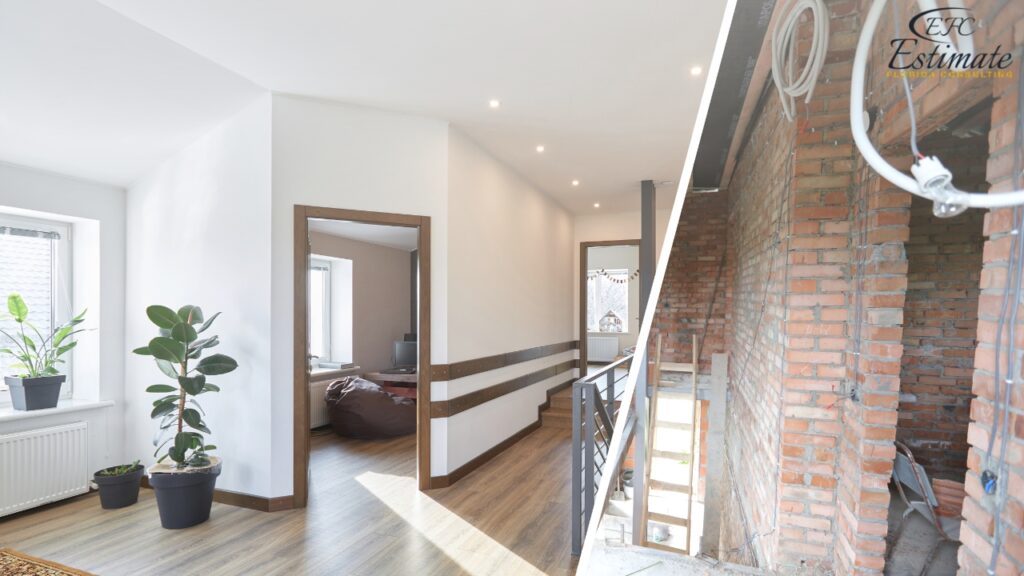
Full Home Renovation Cost Factors
Renovating a 1,250- to 1,600-square-foot home can cost anywhere from $3,600 to $219,600, depending on the project’s scope, the rooms you want to remodel, utility upgrades, permits, labor, and more. The average cost is around $61,893.
The wide cost range is due to numerous factors, which we will discuss below.
Home Size
House renovation costs average between $18 to $72 per square foot, but this range can increase significantly depending on the quality of materials used. Custom paints, high-end flooring, or other premium finishes can push costs up to $180 per square foot.
Even with standard finishes, the square footage of your home is a significant factor in determining renovation costs.
House Square Feet | Average Cost Range |
1,250 | $22,500 – $90,000 |
1,600 | $28,800 – $115,200 |
2,000 | $36,000 – $144,000 |
2,500 | $45,000 – $180,000 |
3,500 | $63,000 – $252,000 |
Home Age
Renovations for older homes start around $120,000 and can increase from there. These projects are usually more expensive than those for newer homes, as you’ll likely need to update plumbing, electrical, and HVAC systems. Additionally, older homes may reveal hidden problems during the renovation process, such as termite damage or water damage in the basement.
Moreover, older homes might be considered historical landmarks, requiring additional time and money to ensure compliance with historical renovation laws in your area.
Permits
Major home improvement projects often require permits, which typically cost between $600 and $3,000. If you plan to add rooms, work on plumbing, or install or modify existing wiring, you or your contractor will need to file for the necessary permits. Smaller updates, such as painting a room, usually do not require permits. Be sure to check your local rules and regulations regarding required permits for your project, or consult your contractor for guidance.
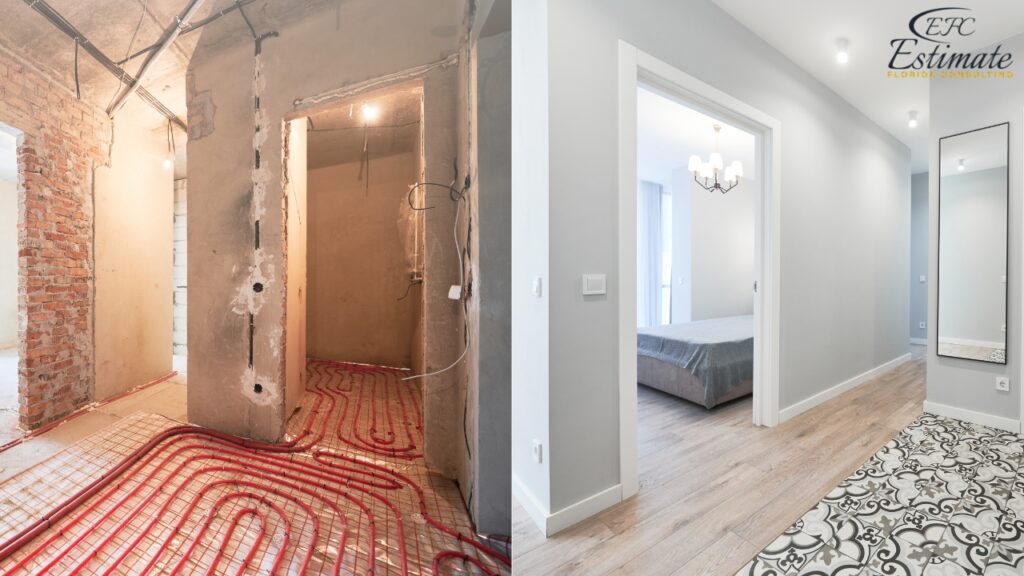
Alternate Living Expenses
For minor or contained renovations, such as redoing one of several bathrooms or a single bedroom, you and your family can usually stay in your home while contractors work. However, for larger projects, you may need to consider the cost of alternative living arrangements, such as renting a mobile home on your property or staying in an extended-stay hotel. These options can range from $2,400 to $12,000 or more, depending on the duration of your stay.
Projects that may require alternate living arrangements include:
- Second-story dormers
- Gut renovations
- Renovations involving the only bathroom in the home
- Replacement of materials containing asbestos or mold
- Home additions
- Structural work, including changing the floor plan
Geographic Location
Your home’s physical location can significantly affect renovation costs. Regional and local labor and material prices vary greatly, impacting home improvement project expenses. Labor charges in metropolitan areas are typically higher than in rural locations. While regional material prices also vary, labor costs usually have a greater impact on the overall expense.
Floor Plan Changes
Modifying the floor plan of a room or area can cost around $420 to $600 for minor changes, and over $12,000 for major alterations. These changes may involve knocking down or constructing new walls or rerouting electrical and plumbing systems. To ensure safety and compliance, you’ll need to hire a structural engineer and other certified professionals.
Updating Appliances
When installing new kitchen cabinets or a custom laundry storage system, you might consider upgrading appliances such as the fridge or washer and dryer. New appliances can range from $240 to $12,000 each, depending on the type and quality. Energy Star-rated appliances typically cost between $240 to $4,200, while custom built-in appliances can range from $1,200 to $12,000.
Mold or Asbestos Remediation
Mold remediation averages around $2,676, while asbestos removal costs between $1,440 and $3,720, depending on the extent of the damage. Professional remediation is essential to protect your family’s health. If you discover mold or asbestos during a DIY renovation, halt the process and hire a professional immediately.
You might need alternative housing during remediation if mold or asbestos could become airborne and pose a health risk, adding to the overall cost.
Foundation Repairs
Foundation repairs typically range from $2,640 to $9,240 and are crucial for maintaining the structural integrity and safety of the home. A structural engineer is usually required to ensure proper repair and maintenance. Foundation issues should be addressed before beginning any other renovations.
Plumbing
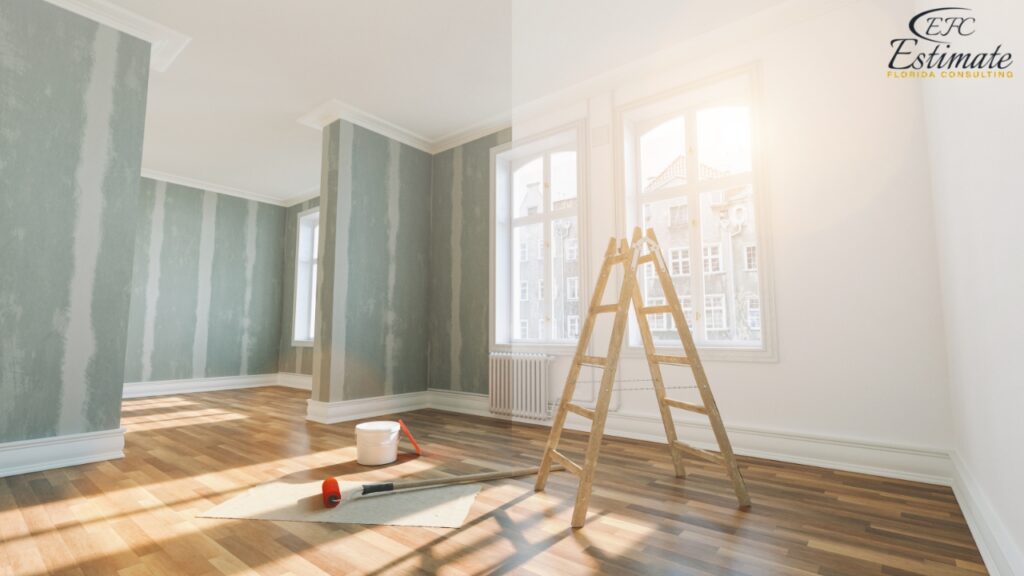
Installing or replacing plumbing generally costs between $420 to $2,400. Simple plumbing repairs, such as fixing leaky pipes, average about $396. Labor costs for hiring a plumber range from $216 to $600 per hour. Extensive plumbing work, such as roughing in plumbing for a new home addition, will likely exceed $2,400.
Electrical
Rewiring a house can cost from $1,800 for minor projects to over $12,000 for a complete rewire. Installing new outlets costs about $90 to $588 per outlet, while upgrading an electrical panel averages around $1,500. Electricians typically charge between $60 to $120 per hour.
Extensive renovations, such as gutting a house or adding a dormer or home addition, will increase the costs for electrical work.
HVAC
While updating the rooms in your home, you might also want to ensure they remain cozy and comfortable year-round with a repaired or new HVAC system. HVAC repairs now cost an average of $504, while installing new heating or cooling systems ranges from $7,200 to $18,000. Upgrading to a new system may be necessary if you’re adding significant square footage to your home that requires heating and cooling.
Labor
Labor costs for a home renovation can range from $28.80 to $216 per hour, depending on the type of professional required for each part of the work. Several specialists may be needed, including electricians for rewiring or adding outlets and interior designers to create a cohesive look across multiple rooms.
Overall, labor costs will account for 50% to 60% of your total renovation expenses. Additionally, hiring a general contractor or construction manager to oversee the work may add about 10% to 20% to your overall costs.
Professional Contractor | Average Cost per Hour |
Architect or designer | $180 – $276 |
Carpenter | $60 – $96 |
Drywall installer | $48 – $72 |
Electrician | $84 – $156 |
HVAC installer | $96 – $156 |
Painter | $48 – $72 |
Plumber | $108 – $156 |
Roofer | $72 – $96 |
Get 5 New Leads Next 7Days With Our System
- Multi-Family Building
- Hotel Building
- Hospital Building
- Warehouse Building
- High-Rise Building
- Shopping Complex
Home Renovation Cost by Room Type
When renovating your home, you may choose to overhaul all the rooms at once or tackle them one at a time. Keep in mind that wet rooms (those requiring running water) cost more to renovate than dry rooms. Here are some typical costs to expect for renovating each room, with prices ranging from $1,500 to over $50,000 per room.
Living Room
Remodeling the living room costs about $6,000 to $12,000, depending on the changes you want to make. Simpler projects like adding a fresh coat of paint, new baseboards, and swapping out light fixtures will fall on the lower end of the price range. In contrast, adding new outlets or rewiring the room, installing new windows, replacing flooring, and other major upgrades can cost over $72 per square foot.
Bedroom
Bedroom renovations are among the most affordable changes you can make in a home, costing about $1,800 to $6,600 per bedroom. Upgrades may include a fresh coat of paint, new storage shelves, a closet organization system, or new furniture. Custom materials and finishes will increase the cost. Additionally, converting another type of room, like an attic or garage, into a bedroom will significantly increase renovation prices, up to $48,000.
Kitchen
Kitchen renovations cost about $17,460 to $48,480. You can make minor upgrades, such as adding a kitchen backsplash and upgrading your countertop and lighting, for less than $24,000. A major overhaul with new flooring, custom cabinets, smart appliances, and luxury materials may cost over $84,000.
Bathroom Renovation
Remodeling a bathroom costs about $13,500 on average. Small bathrooms cost around $7,920, but adding premium finishes like marble flooring or rainfall showerheads can increase the cost to $33,600 or more. The type of bathroom you’re renovating significantly affects the total cost:
- Powder room: $1,800 to $12,000
- Half bathroom: $3,600 to $18,000
- Full bathroom: $6,000 to $24,000
- Master suite bathroom: $8,400 to $36,000+
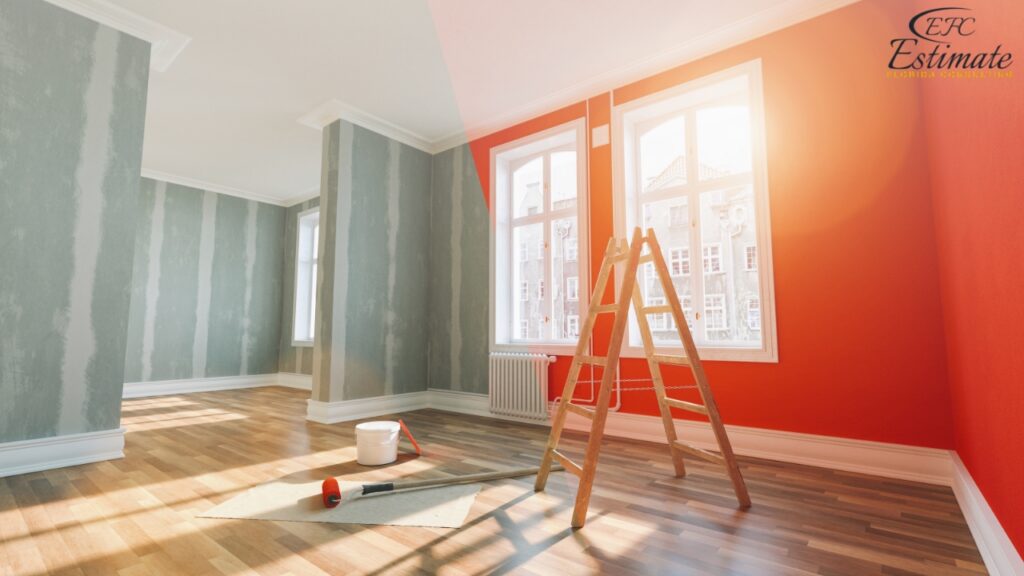
Bathroom remodels are among the most popular projects for homeowners, and costs can be reduced by choosing budget-friendly features and fixtures.
Basement Renovation
A basement remodel costs an average of $26,040. Although basement remodels have a high upfront cost, they offer a generous return on investment (ROI). The average cost is about $36 to $90 per square foot, so the larger the basement, the higher the price. Transforming the basement into a cozy home theater costs about $14,400, while creating a basement gym ranges from $360 to $18,000.
Attic Renovation
Finishing or renovating an attic costs about $5,520 to $19,680. If you haven’t inspected your attic recently, you may need to address issues like pest removal, water damage repair, or new insulation before focusing on aesthetic upgrades like paint colors or flooring. Extensive attic remodeling or conversion typically costs about $240 per square foot.
Garage Renovation
Garage remodels offer various upgrade options, costing anywhere from $1,800 to $60,000. Simple upgrades like sealing concrete floors, repainting walls, or installing storage shelves can cost as low as $2.40 to $6 per square foot. In contrast, converting a garage into a living space costs over $103.20 per square foot.
Home Renovation Costs by Scope
The cost of renovating a home varies significantly depending on the extent of the project. Renovating an entire home generally incurs higher expenses than updating just a few rooms. Additionally, gutting a house down to its framework or restoring a historic home can result in substantial upfront costs.
Project Size | Average Cost |
Whole house | $12 – $72 per square foot |
Gut and remodel | $72 – $180 per square foot |
Historic home | $120 – $240 per square foot |
Home rehab | $12 – $72 per square foot |
Home addition | $5,400 – $180,000 |
Whole-House Renovation Cost
Renovating an entire house typically costs around $61,894, with a range of $14 to $86 per square foot. However, prices can escalate to approximately $219,600 for larger homes or projects that incorporate custom designs and luxury materials.
Gut and Remodel Renovation
Gutting a house down to the studs and remodeling the remaining framework into a livable space costs between $120,000 and $780,000. This labor-intensive and time-consuming process typically costs about $86 to $216 per square foot.
Historic Home Remodeling
Renovating historic homes costs approximately $144 to $288 per square foot. Restoring a historic home involves meticulous planning and care, often resulting in higher costs compared to modern homes. This is partly due to the need for special permits and materials to comply with local regulations.
For instance, homes built in the 1930s or earlier may have outdated electrical wiring or plumbing that must be updated to meet current safety codes. This additional work increases costs, and restrictions on using modern, more affordable materials can further drive up prices.
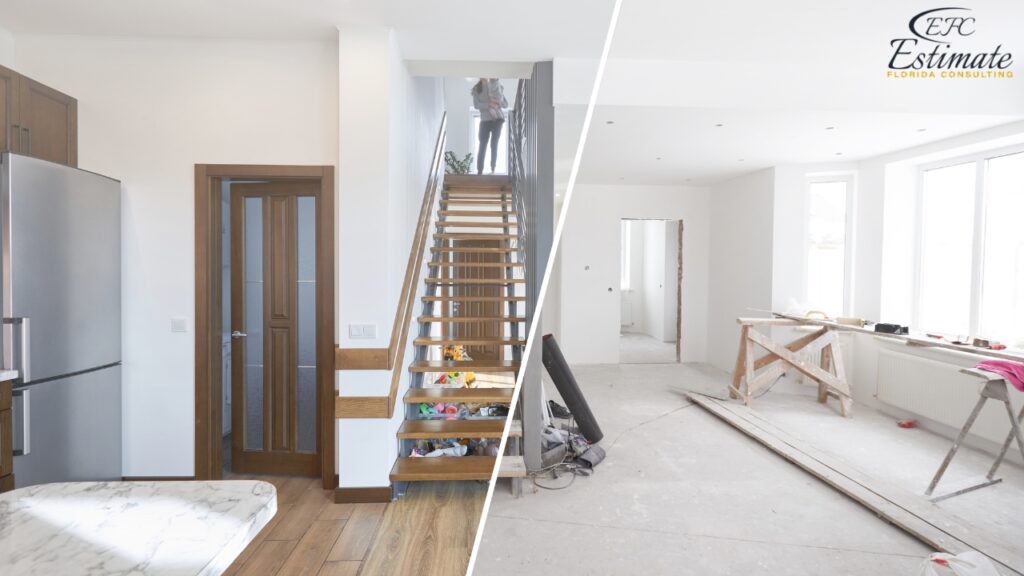
However, if you remodel a home listed in the National Register of Historic Places, you may qualify for state or federal grants to help offset construction costs.
Rehabbing a Home
Rehabbing a home, often referred to as “flipping” a house into an upgraded investment property for profit, costs about $14 to $86 per square foot. Prices can increase if the project involves upgrading builder-grade materials to high-end options, such as luxury hardwood floors or customized paint, tile, and wallpaper.
Home Addition
Home additions typically cost between $32,256 and $116,640. Popular examples include adding a detached garage or a second bathroom near your family den. While home additions create more living space, they can be expensive due to the need for new foundations, framing walls, adding siding, installing drywall and insulation, and finishing the interiors.
Here are some common add-on prices:
- Bathroom: $7,200 to $50,400
- Bump-out: $5,760 to $43,200
- Mudroom: $5,760 to $25,920
- Sunroom: $28,800 to $103,680
- In-law suite: $12,384 to $144,000
- Second-story dormer: $115,200 to $360,000
Cost to Renovate a Home Yourself
A minor home renovation that you undertake yourself could cost between $1,200 and $6,000, depending on the scope of the project. However, we strongly recommend limiting DIY efforts to small projects.
Most home renovation projects are extensive undertakings that often involve working with electrical wiring, plumbing, and structural systems. Without expert knowledge, you risk damaging your home and facing potential injuries or even life-threatening hazards like electrocution.
For larger renovations, it’s best to rely on professionals such as architects, structural engineers, demolition crews, electricians, plumbers, and local home renovation companies. Their expertise ensures the job is done safely and correctly.
DIY vs. Hiring a Pro
Labor costs typically account for 50% to 60% of the total home renovation expenses. By doing the work yourself, you could potentially save an average of $30,000 to $36,000. However, unless you are a general contractor with certifications in plumbing and electrical work, it is not advisable—nor often legal—to handle all aspects of the renovation yourself.
You can still save around 10% on labor costs, which amounts to an average of $6,000 to $12,000, by taking on smaller, more manageable tasks, such as:
- Installing insulation
- Hanging drywall
- Connecting plumbing fixtures
- Installing lighting fixtures
- Spackling and mudding
- Painting
Download Template For Renovation Project Breakdown
- Materials list updated to the zip code
- Fast delivery
- Data base of general contractors and sub-contractors
- Local estimators

Ways to Save Money on Home Renovation Costs
Renovating a house can be expensive, but there are effective strategies to save money while still achieving your dream home.
- Choose Budget-Friendly Materials Opt for mid-range materials instead of premium ones. These options are more durable than the cheapest materials and provide a similar aesthetic at a lower cost compared to high-end alternatives.
- Complete Some Work Yourself While you may not be able to manage an entire renovation, you can save on labor costs by handling smaller tasks yourself. Painting rooms, removing old carpets, or installing shelves are manageable projects for many homeowners.
- Consider Short- and Long-Term Savings Avoid the temptation to choose the cheapest materials available. Low-cost options might save you money upfront but can lead to higher maintenance, repair, or replacement costs in the future. Select materials that fit your budget and offer durability and reliability.
- Maximize Space Renovation costs are influenced by the size of the project. Save by optimizing existing spaces instead of adding new square footage. For example, transform a guest bedroom into a dual-purpose room that functions as both a bedroom and a home office.
- Get Multiple Quotes Before committing to any contracts, obtain at least three quotes for each professional service required. Comparing these quotes will help you find the best value and ensure you’re getting quality work for a fair price.
Conclusion
The cost of a full house renovation varies significantly depending on factors such as the home’s size, age, location, and the scope of the project. On average, renovating a 1,250 to 1,600 square-foot home costs around $61,893, but expenses can range from $3,600 to over $219,600. It’s essential to plan meticulously and budget carefully to manage these potential costs effectively. By considering factors such as permits, labor, and material quality, and by opting for cost-saving strategies like DIY tasks and selecting mid-range materials, homeowners can achieve their renovation goals without unnecessary financial strain.
FAQs
The average cost of renovating a house between 1,250 and 1,600 square feet is around $61,893. However, costs can range from $3,600 to over $219,600 depending on the project’s scope.
Several factors influence the cost, including the home’s size, age, geographic location, the scope of the project, permits, labor, utility upgrades, and the quality of materials used.
House renovation costs average between $18 to $72 per square foot, with higher costs for custom paints, high-end flooring, or other premium finishes. For example, a 1,250-square-foot home may cost between $22,500 and $90,000, while a 3,500-square-foot home could range from $63,000 to $252,000.
Renovations for older homes often start around $120,000 due to the need to update plumbing, electrical, and HVAC systems, and address hidden issues like termite or water damage. Compliance with historical renovation laws can also add to the cost.
Permit costs for major home improvement projects typically range from $600 to $3,000, depending on the type and extent of the work being done.
Renovation costs are significantly impacted by the home’s location, with higher labor and material costs in metropolitan areas compared to rural locations. Labor costs usually have a greater impact on the overall expense than material prices.
Additional costs for major renovations may include alternate living expenses if you need to temporarily relocate, updating appliances, mold or asbestos remediation, foundation repairs, plumbing, electrical work, and HVAC system upgrades.
- Living Room: $6,000 to $12,000
- Bedroom: $1,800 to $6,600
- Kitchen: $17,460 to $48,480
- Bathroom: $7,920 to $36,000+
- Basement: $26,040 on average
- Attic: $5,520 to $19,680
- Garage: $1,800 to $60,000
Google Reviews



Process To Get Renovation Cost Estimate Report
Here I am going to share some steps to get renovation cost estimate report.
-
You need to send your plan to us.
You can send us your plan on info@estimatorflorida.com
-
You receive a quote for your project.
Before starting your project, we send you a quote for your service. That quote will have detailed information about your project. Here you will get information about the size, difficulty, complexity and bid date when determining pricing.
-
Get Estimate Report
Our team will takeoff and estimate your project. When we deliver you’ll receive a PDF and an Excel file of your estimate. We can also offer construction lead generation services for the jobs you’d like to pursue further.

